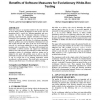Free Online Productivity Tools
i2Speak
i2Symbol
i2OCR
iTex2Img
iWeb2Print
iWeb2Shot
i2Type
iPdf2Split
iPdf2Merge
i2Bopomofo
i2Arabic
i2Style
i2Image
i2PDF
iLatex2Rtf
Sci2ools
GECCO
2005
Springer
2005
Springer
Benefits of software measures for evolutionary white-box testing
White-box testing is an important method for the early detection of errors during software development. In this process test case generation plays a crucial role, defining appropriate and errorsensitive test data. The evolutionary white-box testing is a promising approach for the complete automation of structureoriented test case generation. Here, test case generation can be completely automated with the help of evolutionary algorithms. However, problem cases exist in which the evolutionary test is not able to find valid test data. Thus, in the case of not achieving a test goal, it is not known whether this is due to non-executable program code or a problem case. This paper will investigate how successfully a software measure can support an evolutionary white-box test if the measure can predict the test effort. Hence, the termination criteria of evolutionary white-box testing can be adapted to test goals with problem cases in such a way that problematic test goals are either excluded ...
Related Content
| Added | 27 Jun 2010 |
| Updated | 27 Jun 2010 |
| Type | Conference |
| Year | 2005 |
| Where | GECCO |
| Authors | Frank Lammermann, Stefan Wappler |
Comments (0)

